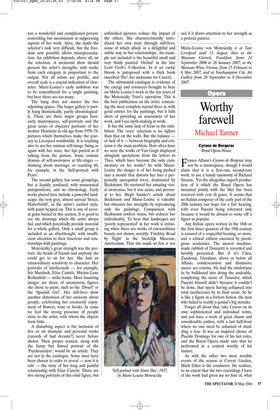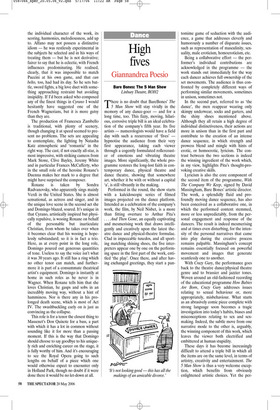Worthy farewell
Michael Tanner
Cyrano de Bergerac Royal Opera House
Franco Alfano’s Cyrano de Bergerac may not be a masterpiece, though I would claim that it is a first-rate second-rate work, to use a handy taxonomy of Richard Strauss. Yet the altogether superb production of it which the Royal Opera has mounted jointly with the Met has been received with very ill grace. It seems that no Italian composer of the early part of the 20th century can hope for a fair hearing, with even Puccini being tolerated only because it would be absurd to write off a figure so popular.
Any Italian opera written in the 18th or the first three quarters of the 19th century is assured of a respectful hearing, or more, and a critical edition executed by prestigious academics. The merest machinemade rubbish of Donizetti is recorded and lavishly presented. But if it’s Cilea, Zandonai, Giordano, above or below all Alfano, condescension and dismissive sneers are routine. He had the misfortune to be bulldozed into doing the undoable, completing the score of Turandot, which Puccini himself didn’t because it couldn’t be done, that opera having collapsed into total incoherence by its final scene. So he is like a figure in a forlorn fiction, the man who failed to rectify a genius’s big mistake.
Forget all about that, take Cyrano on its own sophisticated and individual terms, and you have a work of great charm and considerable pathos, with a last half-hour where no one need be ashamed of shedding a tear. It was an inspired choice of Placido Domingo for one of his last roles, and the Royal Opera made sure that he performed in a context worthy of his stature.
As with the other two most notable events of the season at Covent Garden, Mark Elder is the conductor. He realises, to an extent that the two recordings I have of the work had given me no hint of, what the individual character of the work, its scoring, harmonies, melodiousness, add up to. Alfano may not possess a distinctive idiom — he was restlessly experimental in the subjects he selected and in his ways of treating them — but he is not derivative; fairer to say that he is eclectic, with French influences predominating. He realised, clearly, that it was impossible to match Puccini at his own game, and that can belto, too, had had its day. So he sets battle, sword fights, a big love duet with something approaching restraint but avoiding insipidity. If I’d been asked who composed any of the finest things in Cyrano I would hesitantly have suggested one of the French Wagnerians, but it is more gutsy than they are.
The production of Francesca Zambello is traditional, with plenty of scenery, though changing it at speed seemed to present no problems. The sets are appealing to contemplate, the lighting by Natasha Katz atmospheric and ‘romantic’ in the right way. The cast, if not exactly all-star, is most impressive, with striking cameos from Mark Stone, Clive Bayley, Jeremy White and in particular Frances McCafferty, who in the small role of the heroine Roxane’s Duenna makes her mark to a degree that might have surprised the composer.
Roxane is taken by Sondra Radvanovsky, who apparently sings mainly Verdi in the United States. She is almost sensational, as actress and singer, and in the unique love scene in the second act she and Domingo blazed, soared. It’s unique in that Cyrano, artistically inspired but physically repulsive, is wooing Roxane on behalf of the personable but inarticulate Christian, from whom he takes over when it becomes clear that his wooing is hopelessly substandard; so it is in fact a trio. Here, as at every point in the long role, Domingo poured out generous quantities of tone. Useless to say the voice isn’t what it was 30 years ago. It still has a ring which no other tenor can match, and furthermore it is part of a consummate theatrical artist’s equipment. Domingo is instantly at home in such roles as he never is in Wagner. When Roxane tells him that she loves Christian, he gasps and sobs in an incredibly moving way, without a hint of hamminess. Nor is there any in his prolonged death scene, which is most of Act IV. The swashbuckling early on is just as convincing as the collapse.
This role is for a tenor the closest thing to Massenet’s Don Quixote for a bass, a part with which it has a lot in common without sounding like it for more than a passing moment. If this is the way that Domingo should choose to say goodbye to his uniquely rich and enriching career on the stage, it is fully worthy of him. And it’s encouraging to see the Royal Opera going to such lengths on behalf of a piece which one would otherwise expect to encounter only in Holland Park, though no doubt if it were done there it would be no let-down at all.



















































































 Previous page
Previous page